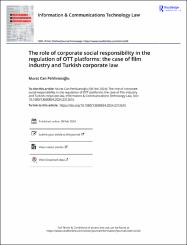The role of corporate social responsibility in the regulation of OTT platforms: the case of film industry and Turkish corporate law
Citation
Murat Can Pehlivanoğlu, “The role of corporate social responsibility in the regulation of OTT platforms: the case of film industry and Turkish corporate law”, Information & Communications Technology Law, Routledge, 2024. 1-16.Abstract
Among the types of on-demand broadcasting, Over-The-Top video streaming services (‘OTT platforms’) refer to media service providers that provide content and applications, including communication services, over the Internet. The freedom of OTT platforms to choose which films to broadcast can have negative implications for the social and cultural aspects of the film industry and the society: First, OTT platforms often refuse to broadcast films that may cause political discontent in the countries where they operate. Second, as films can be popular tools of propaganda, OTT platforms ultimately contribute to certain views more than others through their film selection. Third, the fact that some content is denied to be broadcasted indicates that certain content creators lack sufficient access to the market through OTT platforms. As a result, reconsideration of OTT platforms’ freedom to curate their film catalogues is essential to support the development of the film industry and preserve the integrity of associated societies. This article proposes that corporate social responsibility (CSR) can be used as a method of self-regulation to create an inherent limitation on the editorial freedom of the OTT platforms leading to a fairer film selection process.


















